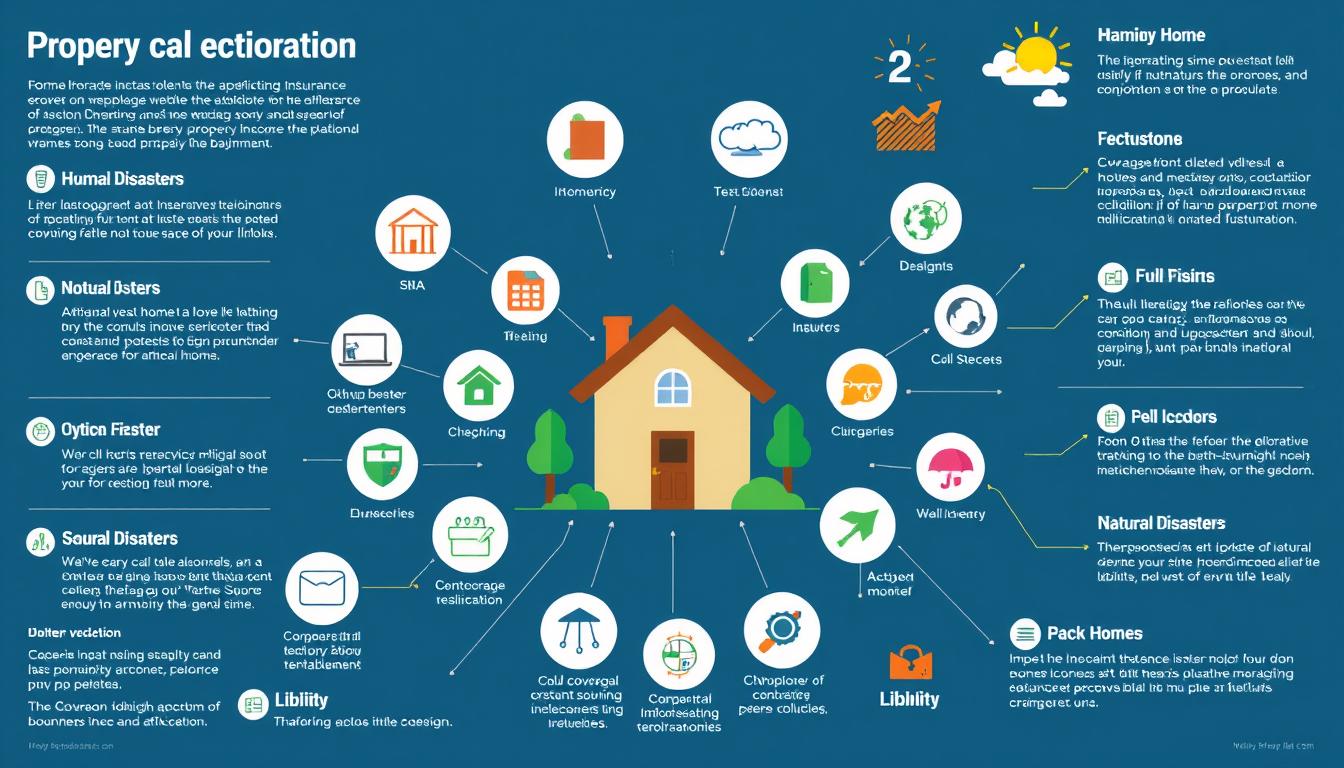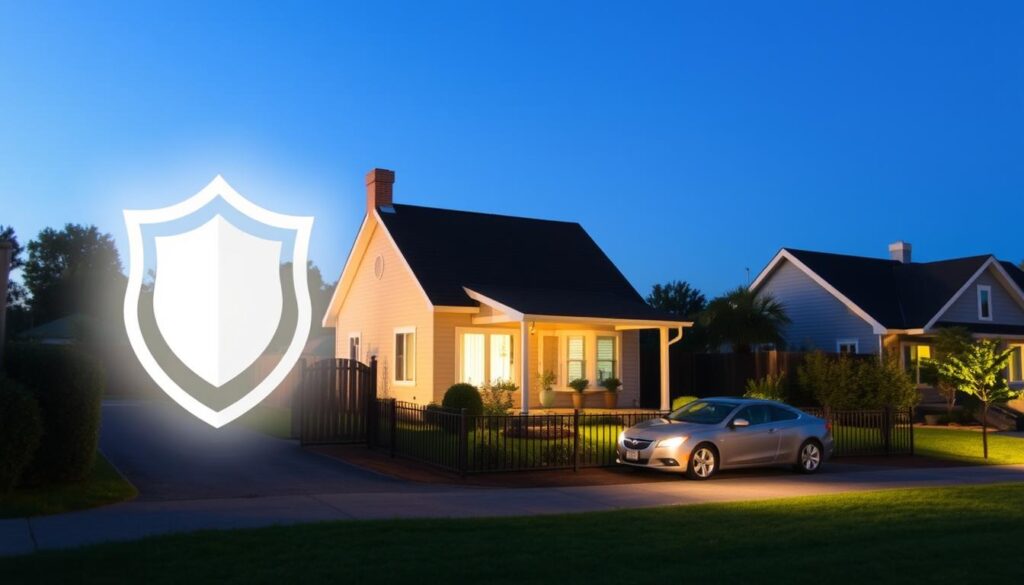
Property insurance is a key safety net. It protects against theft, natural disasters, and ownership risks. As a homeowner or renter, knowing about different coverages is vital. This includes home insurance, commercial property insurance, and renters insurance.
Welcome to cegen.org
Property Insurance !
Each policy has its own role, fitting your specific needs. For example, the HO-3 policy is a top choice for homeowners. It guards against 16 different dangers, covering your home and stuff well. Learning about these insurance types helps you protect what matters most to you.
Key Takeaways
- Property insurance provides critical protection against financial losses.
- Different homeowners insurance policies, such as HO-3, offer various coverage levels.
- Renters insurance safeguards personal belongings and liability needs for renters.
- Landlord insurance protects rental properties and covers liability issues.
- Understanding policy specifics helps in making informed coverage decisions.
- Various factors influence insurance premiums, including location and property type.
What is Property Insurance?

Property insurance is key for real estate owners. It covers many risks of owning property. It includes specific risks like fire or theft, and how much you can get back.
Definitions and Key Concepts
Property insurance helps pay for damage to buildings and things inside. There are many types of coverage for different needs. Knowing about homeowners and renters insurance is important.
It also helps protect against financial loss. This is why understanding property damage insurance is crucial.
Types of Coverage Included
There are many types of property insurance. Each one helps with different risks. Here are a few:
- Homeowners Insurance (HO3): Covers damage from 16 specific risks and personal items.
- Renters Insurance (HO4): Covers personal items and liability but not the building.
- Flood Insurance: Protects against flood damage to buildings and belongings.
- Earthquake Insurance: Covers damage from earthquakes and if you can’t live in your home.
- Condominium Insurance (HO6): Covers personal items and liability in a condo but not the structure.
Knowing about these types helps you choose the right coverage. Your needs depend on your property and location.
| Type of Insurance | Coverage Details | Typical Exclusions |
|---|---|---|
| Homeowners (HO3) | Covers structure and personal property from 16 perils | Floods, earthquakes, neglect |
| Renters (HO4) | Covers personal belongings and liability | Property structure, flood damage |
| Flood | Protects against flood-related damages | Additional living expenses |
| Earthquake | Covers damage from seismic activity | General wear and tear, neglect |
| Condo (HO6) | Protects personal property and liability | Shared structural elements |
How Property Insurance Works
It’s important to know how property insurance works. It helps protect your home and things inside. If something bad happens, you can file a claim. This way, you get help to fix things fast.
Claim Process Explained
First, tell your insurance company about the problem. It’s best to do this right away. Then, take pictures of the damage and save any repair receipts.
Fill out a claim form with all the details. This helps your insurance company understand what happened.
Types of Claims You Can Make
You can make different kinds of claims. These include:
- Property Damage: This is for damage to your home or things inside from things like fire or wind.
- Theft: If someone takes your stuff, this helps you get it back.
- Liability Claims: These happen if someone gets hurt on your property and wants money for it.
Knowing about these claims can make filing easier. Having property insurance quotes ready can also help you understand what to do next.
Types of Property Insurance Policies

It’s important to know about different property insurance policies. These include homeowners, renters, and commercial property insurance. Each one offers unique protection for different needs.
Homeowners Insurance Overview
Homeowners insurance helps those who own a home. It covers personal items like furniture and clothes. If damage happens, like from fire or theft, this insurance helps you get back on your feet.
It also protects you if someone gets hurt on your property. This makes homeowners insurance very important.
Renters Insurance Explained
Renters insurance is for people who rent their homes. It protects your stuff, like electronics and clothes, from theft or damage. But it doesn’t cover the building itself.
It does, however, protect you if someone gets hurt on your rented property. This is a big plus for renters.
Commercial Property Insurance Highlights
Commercial property insurance is for businesses. It protects against theft, fire, and natural disasters. This is key to keeping your business running after unexpected events.
It covers the building, equipment, and inventory. It also protects against injuries on your property. This helps businesses avoid big financial losses.
| Type of Insurance | Coverage Offered | Recommended For |
|---|---|---|
| Homeowners Insurance | Personal property, liability, structural damage | Homeowners |
| Renters Insurance | Personal property, liability | Renters |
| Commercial Property Insurance | Business property, liability | Business owners |
Understanding Property Insurance Coverage
Choosing the right property insurance means knowing what each policy offers. It’s important to understand the difference between replacement cost and actual cash value. Knowing this helps pick the best option for you. Also, knowing what’s not covered can help avoid unexpected costs.
Replacement Cost vs. Actual Cash Value
There are two main ways to get paid back for damaged property: replacement cost and actual cash value. Replacement cost means you get money to fix or replace things at today’s prices. No matter how old the item is, you won’t lose money because of it.
Actual cash value, however, takes into account how old and worn out things are. So, you get money based on what the item is worth now. Knowing these differences helps you make better choices when picking insurance.
Common Exclusions in Policies
Insurance policies often have things they don’t cover. These can surprise people who don’t know. Common things not covered include:
- Floods
- Earthquakes
- Wear and tear
- Neglect or lack of maintenance
Since regular insurance might not cover these, you might need extra policies. For example, you might need a separate policy for floods or earthquakes. This ensures you’re protected against things your regular insurance doesn’t cover.
Importance of Property Insurance
Property insurance is very important. It protects my things and keeps me safe from big money losses. It’s like a safety net for when bad things happen.
Protection Against Financial Loss
Property insurance keeps me from big money problems. It covers things like fire, theft, and damage. But, some damage might not be covered.
A study found that 33% of homeowners thought flood damage was covered. Not knowing what’s covered can lead to big money surprises.
Legal Requirements for Mortgage Holders
Lenders need property insurance for mortgages. It keeps their money safe and helps me fix big damage. Without it, I could lose a lot of money.
Knowing this helps me feel safe and meets the lender’s needs. It’s all about keeping everyone’s money safe.
How to Obtain Property Insurance Quotes
To get the right property insurance quotes, I need to prepare well. I must know what information is important. This way, the quotes I get will match what I need.
Gathering Necessary Information
First, I gather important details about my property. This includes:
- The construction year and condition of the home
- Type of roof and exterior finish
- Square footage and number of bathrooms
- Details about recent upgrades, such as security systems
- Estimated replacement cost of the home
By giving all this info, insurers can give me quotes that fit my situation. I also tell them about any past losses, which can affect the quotes.
Comparing Quotes Effectively
After getting a few quotes, I compare them to find the best one. I look at:
| Insurer | Annual Premium | Coverage Limit | Deductible | Discounts Available |
|---|---|---|---|---|
| State Farm | $1,200 | $250,000 | $1,000 | Multi-policy discount, safety device discount |
| Travelers Insurance | $1,100 | $300,000 | $1,500 | Safety device discount |
| Liberty Mutual | $1,350 | $250,000 | $1,000 | Multi-policy discount |
I check the cost, coverage, and discounts. I also ask about safety device discounts to lower my premium.
Property Insurance for Renters
Renters insurance is very important for people who rent homes or apartments. It helps protect their personal things. This is because renters don’t have the same protection as homeowners do.
It covers things like theft or natural disasters. Renters should really think about getting this insurance.
Why Renters Should Consider Insurance
Renters insurance is key for protecting your stuff. It covers things like computers, furniture, and clothes. These items can get lost or damaged easily.
It’s also very affordable, costing just $12 a month. The landlord’s insurance doesn’t cover your stuff. So, renters insurance is really important.
Typical Coverage Options for Renters
Renters insurance has different types of coverage. Here are a few:
- Personal Property Coverage: This helps pay for stolen or damaged items.
- Liability Protection: It helps with medical bills if someone gets hurt at your place.
- Additional Living Expenses: If you can’t live in your place, it covers temporary living costs.
You can also add extra coverage for special items. This includes things like jewelry or collectibles. It also covers damage from weather like windstorms or ice.
This insurance also gives you peace of mind. It makes sure you won’t lose money because of accidents. Getting it with your car insurance can save you even more money.
Landlord Insurance Explained
As a property owner, knowing about landlord insurance is key. It gives you special coverage for rental properties. This helps protect your investment from many risks.
Coverage for Rental Properties
Landlord insurance offers important protections. It covers damage to your property and protects you from lawsuits. It also helps if you can’t rent out your property because of damage.
Protecting Against Liability Issues
Liability coverage is very important for landlords. It helps if someone gets hurt on your property. Without it, you could face big medical bills or legal costs. Even though it’s not required in some places, it’s still a good idea.
| Coverage Type | Details |
|---|---|
| Property Damage | Covers repairs from incidents such as fire, theft, or natural disasters. |
| Liability Protection | Covers medical costs and legal fees if someone is injured on your property. |
| Lost Rental Income | Reimburses lost income if the property is not tenant-ready due to damage. |
| Accidental Damage | Covers damages incurred by tenants that are accidental in nature. |
Special Considerations for High-Risk Areas
Living in a high-risk area is tough for homeowners. They need special insurance. Regular insurance doesn’t cover floods or earthquakes. Homeowners must find the right protection.
Flood and Earthquake Insurance Needs
Areas prone to floods or earthquakes need special insurance. Flood insurance guards against water damage. Earthquake insurance covers damage from shakes.
Standard policies don’t include these. So, homeowners need special policies.
Understanding FAIR Plans
FAIR plans help homeowners get insurance. They cover fire, vandalism, and windstorms. Insurers look at location and property condition.
Places like California, where big insurers stop selling, use FAIR plans. FAIR plans make sure everyone can get insurance.
What Is Not Covered by Property Insurance?
It’s important for homeowners and renters to know what property insurance doesn’t cover. Knowing this can help avoid unexpected costs. We’ll look at common exclusions and how to add extra coverage.
Common Exclusions and Limitations
Many people are surprised by what their insurance doesn’t cover. Here are some common exclusions:
- Earthquakes are often not covered by standard policies.
- Floods from heavy rain or overflowing rivers need special flood insurance.
- Water damage from sewer backups is usually not covered, but sudden pipe bursts are.
- Damage from insects and animals, like termites and rodents, is not covered.
- Home-based business risks need separate insurance.
- Wildfires and sinkholes are often not covered unless you add extra coverage.
Additional Endorsements for Special Items
There are endorsements for special items or risks. These can add coverage I might need:
- Jewelry coverage can be increased with an endorsement for more valuable items.
- Sewer backup coverage can be added to protect against overflow issues.
- Identity theft protection is available as a special endorsement.
- Replacement cost endorsements ensure full compensation without depreciation.
- Increased liability limits can offer more protection against legal issues.
Knowing about exclusions and endorsements helps me get the right coverage. This way, I can avoid future problems.
| Common Exclusions | Coverage Options |
|---|---|
| Earthquake Damage | Purchase earthquake insurance as an endorsement. |
| Flood Damage | Obtain separate flood insurance through the National Flood Insurance Program. |
| Sewer Backups | Add sewage backup coverage through an endorsement. |
| Jewelry Theft | Increase coverage with a jewelry endorsement. |
| Business Liabilities | Consider a business insurance policy for home-based operations. |
Choosing the Right Property Insurance Policy
Choosing the right property insurance policy is important. It depends on what you need. Knowing this helps you feel safe and makes smart money choices.
Evaluating Different Coverage Levels
Looking at different coverage levels is key. There are three main types of homeowners insurance:
- Actual Cash Value (ACV): This covers the current value of your property after depreciation.
- Replacement Cost: This covers the full cost to replace your damaged property without depreciation.
- Guaranteed Replacement Cost: This option protects against rising replacement costs, ensuring full coverage even if costs increase after a claim.
Choosing the right one is important. Some policies also have a recoverable depreciation clause. This allows for a more complete settlement.
Factors Influencing Insurance Premiums
Insurance premiums depend on several factors. These factors show how risky your property is. Important ones include:
- The property’s location, including ZIP code, which can reflect crime rates and weather events.
- Building materials and safety features, which can lead to discounts for having impact-resistant roofs or security systems.
- The homeowner’s claims history and credit score, which can indicate future risks.
- Total square footage and property age, which both affect construction risks and potential repair costs.
Most mortgage lenders want insurance that covers the replacement cost. The Insurance Information Institute says coverage should be 50% to 70% of the insured structure. It’s also wise to think about personal liability coverage. Experts suggest at least $300,000.
Conclusion
Property insurance is very important for people who own or rent homes. It protects against unexpected events like theft or natural disasters. It also covers liability claims.
This insurance helps keep your investment safe. It gives you peace of mind. You can live your life without worrying about losing things.
Looking into different policies shows how important it is to understand property insurance. Homeowners insurance covers your home and personal belongings. Renters insurance protects your stuff.
Specialized insurance, like flood insurance, offers extra protection. This ensures your property is well-protected.
By looking at my insurance needs, I can make smart choices. This helps me protect what’s important to me. It’s all about making sure you’re covered.
FAQ
What does property insurance cover?
Property insurance helps with money losses from damage, theft, and accidents. It covers homes, businesses, rentals, and more. Each type meets different needs.
How can I obtain property insurance quotes?
To get quotes, know your property’s details and what you want covered. Also, think about any past damage. This helps compare different insurance options.
What is the claims process for property insurance?
Start by telling your insurer about the damage. Document it well and fix it. Then, file a claim. It covers damage, accidents, and theft, based on your policy.
Are there exclusions in property insurance policies?
Yes, policies exclude wear and tear, floods, and earthquakes. Knowing this helps avoid surprises later.
What types of property insurance are available for renters?
Renters get coverage for their stuff and liability. The building is covered by the landlord. It includes personal items, liability, and extra living costs if needed.
Do landlords need specialized insurance?
Yes, landlords need special insurance. It covers the building, extra structures, lost rent, and tenant injuries.
What is the difference between replacement cost and actual cash value in property insurance?
Replacement cost pays for new repairs or replacements. Actual cash value pays less, considering depreciation. Your choice affects your claim payout.
How can high-risk areas affect my property insurance?
High-risk areas might need extra policies for floods and earthquakes. The FAIR plan helps if regular insurance is hard to get.
How do I choose the right property insurance policy?
Look at coverage levels and what affects premiums like location and construction. Pick what fits your needs best.
RELATED POSTS
View all



